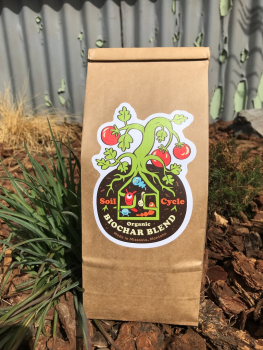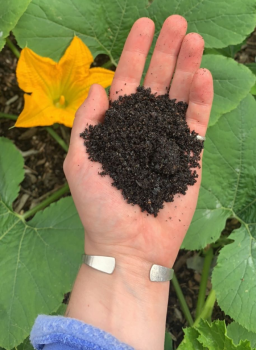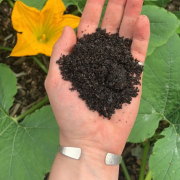Montana Partnership Reduces Food Waste and Supports Sustainable Gardening and Food Production Through Biochar
If you live in Missoula, Montana, you’ve probably seen the blue e-bikes transporting food scraps around town. The nonprofit Soil Cycle began when Missoula resident and backyard gardener, Caitlyn Lewis, saw a nexus between reducing organic waste to divert valuable materials from landfills and improving her neighborhood gardens’ growing potential by making biochar.
“I think about food a lot because I love to eat and value the effort and beauty of the growing process. Wasted food is a big issue, and I think we should honor our food enough to return it to its natural cycle,” Lewis said.
Six years later, Soil Cycle has gone from Lewis picking up scraps from a few clients to six bikers transporting upwards of 60,000 pounds of compost per year. With a bigger staff and a new executive director, they also educate the community, create quality natural fertilizers, and take compost to a new level, all while remaining human-powered.
Turning a Concept into a Product
 A small local houseplant business contacted Soil Cycle because they wanted a soil amendment that could hold nutrients and water while having a fluffy texture for potted succulents. After doing some research, Lewis learned about biochar and found a partner in Bad Goat Forest Products. This Missoula-based company builds live edge furniture, timber frame, and log shelters using wood sourced from local forest restoration and urban tree removal projects.
A small local houseplant business contacted Soil Cycle because they wanted a soil amendment that could hold nutrients and water while having a fluffy texture for potted succulents. After doing some research, Lewis learned about biochar and found a partner in Bad Goat Forest Products. This Missoula-based company builds live edge furniture, timber frame, and log shelters using wood sourced from local forest restoration and urban tree removal projects.
Mark Vander Meer, the founder of Bad Goat Forest Products, has been practicing and stewarding long-term sustainable forest management in Montana. Soil Cycle team members use the discarded wood shavings from Bad Goat in their 900-degree kiln.
The result is a fine, charred mixture, called biochar, a type of charcoal produced for use in soil by heating biomass in limited oxygen.
Biochar is a very porous, high-carbon form of charcoal that, when mixed into soil, increases airflow, water retention, and nutrient-holding capacity. Its unique structure provides the perfect home for beneficial bacteria, which protects and defends plant roots. Using biochar in the soil allows for continual nutrient and mineral exchange to feed plants and, over time, supports a biologically active carbon storage system, which could help capture the excess carbon in our atmosphere. Biochar provides the most durable form of soil carbon. When produced at high temperatures, it lasts for hundreds to thousands of years in soil.
“We are excited to showcase the potential of biochar because when added to soil, it is one of nature’s many miracles,” said Lewis. “Storing carbon in our soil is also a powerful tool against climate change. It is cost-effective, highly efficient, and designed to work with nature. This unique structure provides the perfect home for beneficial bacteria, which protects and defends plant roots.”
Soil Cycle blends its particular biochar mix with worm castings, Montana volcanic minerals, Azomite, kelp meal, raw sugar, and sand. These materials support plants in homes and gardens to improve overall plant growth, yield, resilience, and nutrient-holding abilities while improving soil moisture retention.
“Our partnership with Bad Goat Lumber has shown us how a waste product – both from wood products and food scraps – can become a rich and valuable source of nutrients when placed under pressure – the diamonds of the soil. This partnership has allowed us to create a product that we couldn’t otherwise by using their facility and biochar-making setup,” said Lewis.
Their Biochar Blend is sold in several nurseries around Missoula and is most popular for house plants. Even though they work with biochar on a small scale, the Soil Cycle team sees potential for backyard gardeners and urban farmers so everyone can experience using it and see its potential application on a larger scale.
Accelerating Biochar
 To replicate partnerships like Soil Cycle and Bad Goat Lumber’s and scale up biochar production for use in agriculture and forestry, the country needs a coordinated research program to inform farmers, ranchers, foresters, and gardeners on which types of biochar will work in their conditions. Congress is crafting the 2023 Farm Bill, which presents a big opportunity to ensure the promise of biochar is realized.
To replicate partnerships like Soil Cycle and Bad Goat Lumber’s and scale up biochar production for use in agriculture and forestry, the country needs a coordinated research program to inform farmers, ranchers, foresters, and gardeners on which types of biochar will work in their conditions. Congress is crafting the 2023 Farm Bill, which presents a big opportunity to ensure the promise of biochar is realized.
The National Center for Appropriate Technology (NCAT) is asking Congress to invest in biochar research through the Farm Bill, specifically under the Biochar Research Network Act. It will authorize the USDA to establish a national-scale research program to test different biochar types in different soils and circumstances. With better research will come innovation and practical tools for Montana farmers, ranchers, gardeners and foresters to improve soil health and productivity, as they help solve climate change by storing carbon in soil.
The continued evolution of biochar has entrepreneurs like Lewis thinking big.
“We know it will take time to educate our customers (and future customers) about the incredible benefits biochar can give their soil. Even though biochar has been used for centuries, it is still new to most people,” Lewis said.

 Courtesy Soil Cycle
Courtesy Soil Cycle
